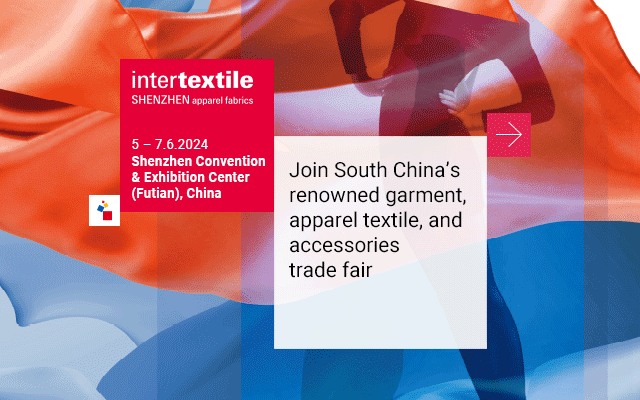Interviews
Your go-to source for news, anytime, anywhere! Insightful industry information from the textile, apparel & fashion world with our news app
Download Now
Your go-to source for news, anytime, anywhere! Insightful industry information from the textile, apparel & fashion world with our news app
Download Now
Your go-to source for news, anytime, anywhere! Insightful industry information from the textile, apparel & fashion world with our news app
Download Now
Your go-to source for news, anytime, anywhere! Insightful industry information from the textile, apparel & fashion world with our news app
Download Now
GSP programme benefits for Asian countries revisited
27 Jul '05
4 min read
The US Administration announced in June, last, that it will provide expanded duty-free trade benefits to Thailand, Indonesia, and other countries devastated by the December 2004 tsunami, and facilitate increased imports from Iraq.
These actions result from the 2004 review of the Generalized System of Preferences (GSP) program. In addition, the Administration determined that over $1 billion in imports from selected developing countries are competitive in the U.S. market, and thus decided that these items should no longer be eligible for duty-free treatment under the GSP program. Importers must now pay normal tariff rates on these items.
"With broad bipartisan support, Congress created the GSP program to expand the American consumer's choices while creating economic opportunities in developing countries. This year's review extends trade benefits to developing nations that have suffered natural disasters, such as last year's tsunami. It is our hope that by promoting increased trade with the United States, we can help these nations recover from the tsunami and other tragedies and generate broad-based economic growth," U.S. Trade Representative Rob Portman said.
"At the same time, we have found that over $1 billion in certain imports from developing countries are now competitive and no longer need duty-free status, so we have taken action to put them on a level playing field with other producers."
"Through this proclamation the Administration adds to the already significant post-tsunami assistance the United States has provided," Portman continued.
"The United States remains the only country to provide tangible, trade-related benefits to tsunami-impacted nations. We are committed to continuing our efforts, including providing trade benefits and trade capacity building, to ensure that the long-term recovery and reconstruction efforts are successful."
The United States has also agreed to provide GSP benefits for approximately $500 million worth of imports of products from Thailand and Indonesia, pursuant to discussions with those governments. In addition, certain tsunami-affected countries of the South Asian Association for Regional Cooperation (SAARC) will be permitted to count inputs from any SAARC county toward meeting the GSP program's rules of origin.
Serbia and Montenegro have become eligible for benefits under the GSP program. This addition reflects the deepening trade and economic relationship between Serbia and Montenegro, and the United States.
In addition, certain fresh or packed whole dates will now be eligible for duty-free treatment when imported from a GSP beneficiary country. This change was made at the request of Iraq, which was designated as a GSP beneficiary country last year. Previously, whole dates were eligible for duty-free treatment only when imported from least-developed GSP beneficiary countries.
The Administration also restored certain GSP benefits to Pakistan in view of its progress in addressing concerns regarding worker rights, as required by the GSP statute, and to India in view of its newly adopted patent protection law.
Items which may now be imported duty-free under the GSP include, for Pakistan, gloves, mittens, and mitts for sports use; certified hand-loomed and folklore pillow covers; and certified folklore wall hangings. Pharmaceutical, agricultural and other chemical items from India will now be eligible for duty-free treatment under the GSP.
In addition, the President extended benefits to or maintained benefits for approximately $660 million in imports through the addition of new products, the restoration of previously lost benefits (other than for Pakistan and India), and the continuation of benefits for products that would otherwise have become ineligible for duty-free treatment. These products include hand-woven rugs, jewelry, contact lenses, electrostatic photocopying apparatus, certain food products, and other items.
The GSP program was created by the Trade Act of 1974. Under the program, more than 140 beneficiary developing countries export approximately 5,000 different products duty-free to the United States. In 2004, these exports amounted to more than $22 billion in trade. Almost all textile and apparel products are ineligible for duty-free treatment under the GSP program.
The GSP program is designed to promote economic development, not to create competition with U.S. industry. Thus, each year, the United States conducts an annual review to determine if there are certain items currently eligible for GSP benefits that could compete at normal tariff rates.
These actions result from the 2004 review of the Generalized System of Preferences (GSP) program. In addition, the Administration determined that over $1 billion in imports from selected developing countries are competitive in the U.S. market, and thus decided that these items should no longer be eligible for duty-free treatment under the GSP program. Importers must now pay normal tariff rates on these items.
"With broad bipartisan support, Congress created the GSP program to expand the American consumer's choices while creating economic opportunities in developing countries. This year's review extends trade benefits to developing nations that have suffered natural disasters, such as last year's tsunami. It is our hope that by promoting increased trade with the United States, we can help these nations recover from the tsunami and other tragedies and generate broad-based economic growth," U.S. Trade Representative Rob Portman said.
"At the same time, we have found that over $1 billion in certain imports from developing countries are now competitive and no longer need duty-free status, so we have taken action to put them on a level playing field with other producers."
"Through this proclamation the Administration adds to the already significant post-tsunami assistance the United States has provided," Portman continued.
"The United States remains the only country to provide tangible, trade-related benefits to tsunami-impacted nations. We are committed to continuing our efforts, including providing trade benefits and trade capacity building, to ensure that the long-term recovery and reconstruction efforts are successful."
The United States has also agreed to provide GSP benefits for approximately $500 million worth of imports of products from Thailand and Indonesia, pursuant to discussions with those governments. In addition, certain tsunami-affected countries of the South Asian Association for Regional Cooperation (SAARC) will be permitted to count inputs from any SAARC county toward meeting the GSP program's rules of origin.
Serbia and Montenegro have become eligible for benefits under the GSP program. This addition reflects the deepening trade and economic relationship between Serbia and Montenegro, and the United States.
In addition, certain fresh or packed whole dates will now be eligible for duty-free treatment when imported from a GSP beneficiary country. This change was made at the request of Iraq, which was designated as a GSP beneficiary country last year. Previously, whole dates were eligible for duty-free treatment only when imported from least-developed GSP beneficiary countries.
The Administration also restored certain GSP benefits to Pakistan in view of its progress in addressing concerns regarding worker rights, as required by the GSP statute, and to India in view of its newly adopted patent protection law.
Items which may now be imported duty-free under the GSP include, for Pakistan, gloves, mittens, and mitts for sports use; certified hand-loomed and folklore pillow covers; and certified folklore wall hangings. Pharmaceutical, agricultural and other chemical items from India will now be eligible for duty-free treatment under the GSP.
In addition, the President extended benefits to or maintained benefits for approximately $660 million in imports through the addition of new products, the restoration of previously lost benefits (other than for Pakistan and India), and the continuation of benefits for products that would otherwise have become ineligible for duty-free treatment. These products include hand-woven rugs, jewelry, contact lenses, electrostatic photocopying apparatus, certain food products, and other items.
The GSP program was created by the Trade Act of 1974. Under the program, more than 140 beneficiary developing countries export approximately 5,000 different products duty-free to the United States. In 2004, these exports amounted to more than $22 billion in trade. Almost all textile and apparel products are ineligible for duty-free treatment under the GSP program.
The GSP program is designed to promote economic development, not to create competition with U.S. industry. Thus, each year, the United States conducts an annual review to determine if there are certain items currently eligible for GSP benefits that could compete at normal tariff rates.
United States Trade Representative Office
Popular News
Leave your Comments
Editor’s Pick
































-Ltd..jpg?tr=w-120,h-60,c-at_max,cm-pad_resize,bg-ffffff)





.jpg?tr=w-120,h-60,c-at_max,cm-pad_resize,bg-ffffff)
.jpg?tr=w-120,h-60,c-at_max,cm-pad_resize,bg-ffffff)






